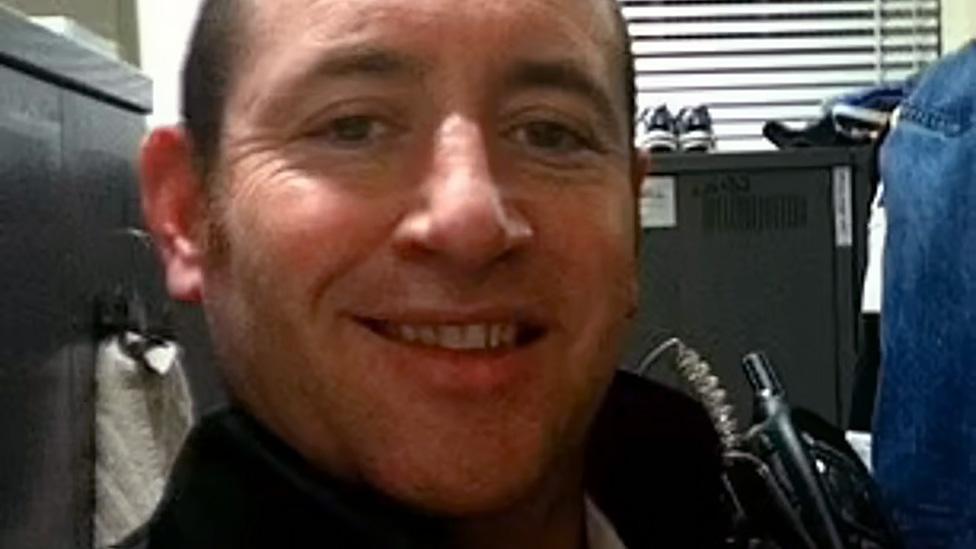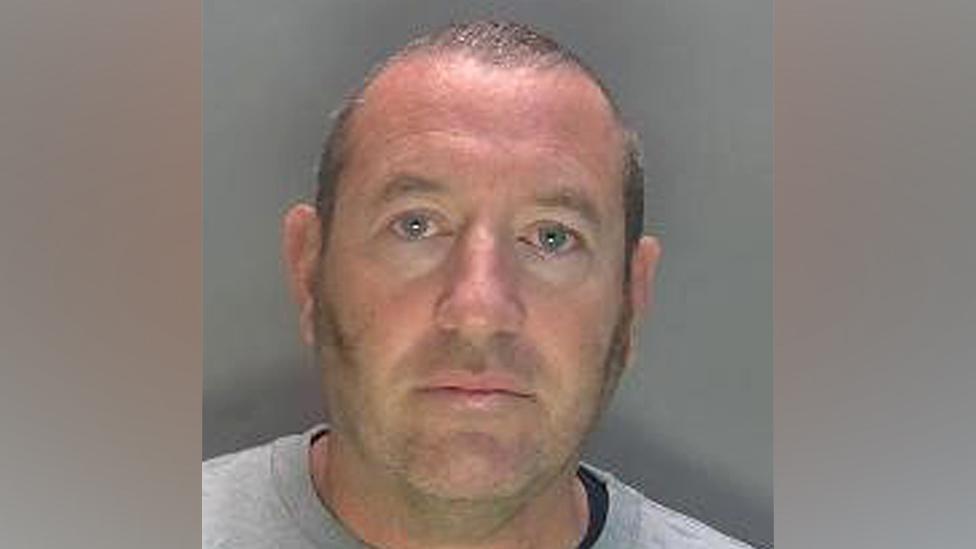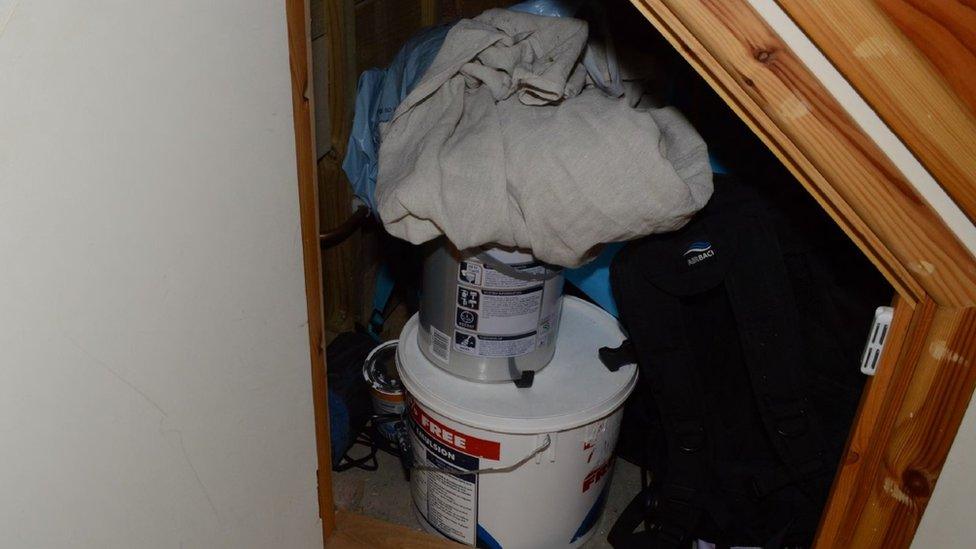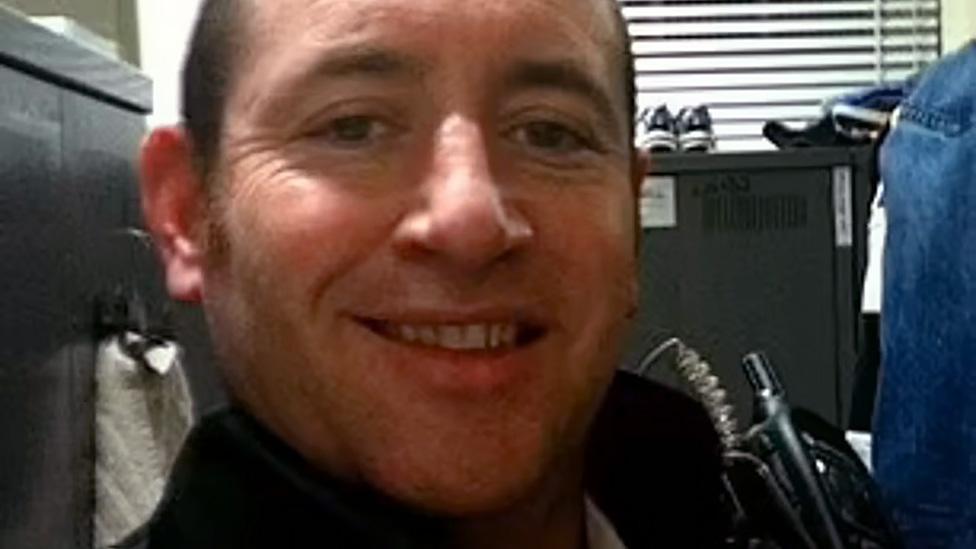David Carrick: Serial rapist PC humiliated victims, court hears
- Published

David Carrick held a gun to the head of one of his victims, the court heard
A victim of serial rapist David Carrick has spoken of meeting "evil" when she was attacked by the Met Police officer who carried out a "catalogue" of sexual offences.
Carrick used his role to intimidate women, threatening one with his baton and sending another a picture of his gun saying "I am the boss".
He is being sentenced for 49 offences against 12 women over two decades.
Carrick would "use his power and control" to stop victims reporting him.
On the first day of a two-day sentencing hearing, Southwark Crown Court heard statements from Carrick's victims, including from one who said: "He was a police officer - what wasn't to trust?"
Another said Carrick "drilled into" her that he was an officer, and she was deterred from raising the alarm.
His crimes include dozens of rape and sexual offences spanning 2003 to 2020, mostly committed in Hertfordshire, where he lived.

David Carrick, from Stevenage, admitted 24 counts of rape
Opening the case, prosecutor Tom Little KC said 48-year-old Carrick told a woman he met in a London bar in 2003 "he was the safest person that she could be with and that he was a police officer" before taking her back to his nearby flat.
Mr Little told the court the victim "froze" when he put a black handgun to her head and said "you are not going", before repeatedly raping her.
He also put his hands around the victim's throat and "said he was going to be the last thing she saw".
Mr Little said the woman attended hospital with her injuries. After stating a police officer had raped her, a nurse said "it might not go to court" and that "she might be better to try to put it behind her and move on".
"As a result, [the victim] did not report the matter to the police at the time," said Mr Little.
In an impact statement read to the court, one victim said: "That night I felt that I had encountered evil."
Another said she had not had a relationship since the attack by Carrick and that it had "shaped my life".
A different woman spoke about changes in eating habits and "poisoning myself" through binge-drinking after encountering Carrick, adding that she had "self-destructive thoughts".

David Carrick committed many of his crimes in Hertfordshire, where he lived
Carrick was sacked by the Met a day after he pleaded guilty last month and the force's Commissioner, Sir Mark Rowley, has apologised for failings and said opportunities to remove him from policing were missed.
It emerged he had come to the attention of police over nine incidents, including rape allegations, between 2000 and 2021.
Mr Little told the sentencing hearing: "If the offending had to be accurately and fairly summarised - it was systematic, it was a catalogue of violent and brutal sexual offences perpetrated on multiple victims, whether he was in a controlling or coercive relationship with them or not, or even if it was just a single occasion.
"It did not matter who the victim was... the reality was, if he had the opportunity, he would rape them, sexually abuse or assault them and humiliate them."
He said: "[Carrick] frequently relied on his charm to beguile and mislead the victims in the first place and would then use his power and control, in part because of what he did for a living, to stop them leaving or consider reporting him."

Carrick falsely imprisoned two women, separately, in the under-stairs cupboard on different occasions
Another woman said Carrick hit her with a whip and would shut her in a small cupboard as punishment while "whistling at her as if she was a dog", the court heard.
The court was told Carrick sent a photograph of himself with a work-issue firearm to her, saying "remember I am the boss".
A woman, who met Carrick on a dating website, described him as "acting like a monster when he was in drink", which was most of the time.
The court heard Carrick would call her his "slave" and when he asked her to clean his house naked she was "scared" because he was a police officer.
Mr Little said the offences warranted a life sentence with a minimum term, but fell short of meriting a whole-life order.
The court heard all of the crimes took place while Carrick, who lived in Stevenage, was a police officer, and that he had undertaken a course on domestic violence in 2005.
In mitigation, defence barrister, Alisdair Williamson KC, told the court Carrick "accepts full responsibility for what he has done".
He said "something has profoundly damaged this man", adding that the defendant "cannot ask for mercy and does not".
Mrs Justice Cheema-Grubb told the court she would sentence Carrick on Tuesday morning.

Find BBC News: East of England on Facebook, external, Instagram, external and Twitter, external. If you have a story suggestion email eastofenglandnews@bbc.co.uk
Related topics
- Published18 January 2023

- Published17 January 2023

- Published16 January 2023

- Published16 January 2023
